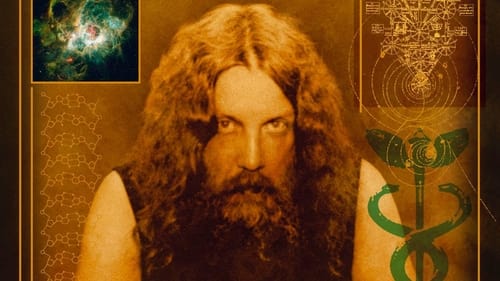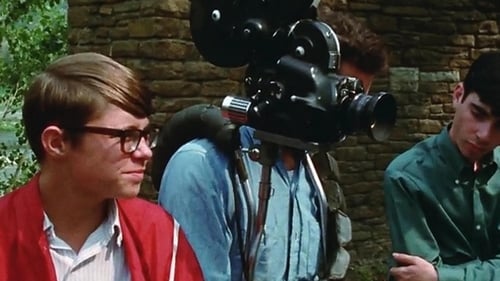
Director
In 1999, the celebrated Montreal photographer Evergon took a remarkable series of nude portraits of his own mother, then 80 years old. The photographs were instantly recognized as a singular achievement: the black and white images embodied not the infirmities of old age, but the timeless strength, dignity, even majesty. In 2007 Margaret Lunt left her long-time home in Niagara Falls, Ontario and moved to Montreal to live with her son. It was shortly afterwards, that filmmaker Donald Winkler embarked on a project that would explore what lay behind that series of photographs, uncovering in the process a poignant family history, a woman's determination to be her own person, how readily she threw off her own deepest cultural conditioning when she discovered both her sons were gay and a most unique and inspiring relationship between mother and son. The result...is Margaret & Evergon.

Assistant Director
The Mindscape of Alan Moore is a psychedelic journey into one of the world's most powerful minds; chronicling the life and work of Alan Moore, author of several acclaimed graphic novels, including "From Hell," "Watchmen" and "V for Vendetta." It is the only feature film production on which Alan Moore has collaborated, with permission to use his work. Alan Moore presents the story of his development as an artist, starting with his childhood and working through to his comics career and impact on that medium, and his emerging interest in magic.

Writer
This short, experimental road movie is a study in mystery and atmosphere. Juxtaposing photographs on the screen with a woman's words, the film tells the story of a couple who drifts apart, of a journey with no return. Introspective and haunting, this mood piece is a travel album about intimacy and dispossession.

Voice
This short, experimental road movie is a study in mystery and atmosphere. Juxtaposing photographs on the screen with a woman's words, the film tells the story of a couple who drifts apart, of a journey with no return. Introspective and haunting, this mood piece is a travel album about intimacy and dispossession.

Director of Photography
This short, experimental road movie is a study in mystery and atmosphere. Juxtaposing photographs on the screen with a woman's words, the film tells the story of a couple who drifts apart, of a journey with no return. Introspective and haunting, this mood piece is a travel album about intimacy and dispossession.

Director
This short, experimental road movie is a study in mystery and atmosphere. Juxtaposing photographs on the screen with a woman's words, the film tells the story of a couple who drifts apart, of a journey with no return. Introspective and haunting, this mood piece is a travel album about intimacy and dispossession.

Director
This short, impressionistic film takes us to Nigeria, Japan, Mexico and India, where craftsmen work clay to produce ritual vessels and everyday objects.

Director
The dossier of an inveterate doodler, a man whose compulsion to put scrawls and squiggles on everything at hand brings him to no good end, according to the narrator, at least. The commentary, delivered with the perspicacity of a coroner's report, follows the development of the doodler's mania from boyhood through adolescence to manhood, when it suddenly breaks all bounds. An amusing "case history" that some of us might identify with.

Assistant Director
When a camera crew are sent to document hippie protests in Yorkville, Canada's counter-culture capital, they are charmed by a group of misunderstood kids with their own ideas about what kind of movie to make.

Director
This short documentary pays tribute to the craftsmen everywhere whose work adds color and richness to life. Filmed in the Canadian Arctic, Finland, India, Nigeria, Japan, Mexico, and Poland, it shows the special skills of artisans working at their crafts - stone sculpture, pottery, ceramics, weaving, dyeing, puppet making, embroidery. Each indigenous skill is a reflection of the culture of the country.

Director
This absorbing documentary looks at the multi-faceted career of F.R. Scott, a truly remarkable Canadian whose work and vision of social justice spanned and influenced an entire era as Canada evolved during the 20th century. The film looks at Scott's role in the founding of the CCF Party in the 1930s, his years as a teacher of constitutional law, as a modernist poet, and as a champion of civil liberties. Appearing also are eminent figures from the fields in which Scott excelled, among them David Lewis and Eugene Forsey. Highlights include Scott's courtroom challenges of the Duplessis regime in the 1950s, his controversial support of the War Measures Act during the 1970 October Crisis in Québec, and readings from his poetry.

Director
This film interview affords a glimpse of a bold and learned mind illuminating important social issues. Responding to questions on the related topics of language, democracy, and the role of the modern university, acclaimed literary critic Northrop Frye explains why education is crucial: "A democracy cannot function without articulate citizens." Frye claims that the university is a place where individual liberty becomes possible, as students learn to question beliefs imposed by society. For Frye, reading and writing are "instruments of freedom."











